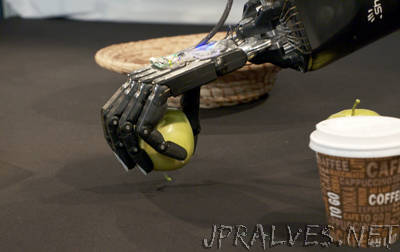
“Researchers at Bielefeld University have developed a grasp system with robot hands that autonomously familiarizes itself with novel objects. The new system works without previously knowing the characteristics of objects, such as pieces of fruit or tools. It was developed as part of the large-scale research project Famula at Bielefeld University’s Cluster of Excellence Cognitive Interaction Technology (CITEC). The knowledge gained from this project could contribute to future service robots, for instance, that are able to independently adapt to working in new households. CITEC has invested approximately one million Euro in Famula. In a new “research_tv” report from Bielefeld University, the coordinators of the Famula project explain the new innovation. “Our system learns by trying out and exploring on its own – just as babies approach new objects,” says neuroinformatics Professor Dr. Helge Ritter, who heads the Famula project together with sports scientist and cognitive psychologist Professor Dr. Thomas Schack and robotics Privatdozent Dr. Sven Wachsmuth. The CITEC researchers are working on a robot with two hands that are based on human hands in terms of both shape and mobility. The robot brain for these hands has to learn how everyday objects like pieces of fruit, dishes, or stuffed animals can be distinguished on the basis of their color or shape, as well as what matters when attempting to grasp the object.”
